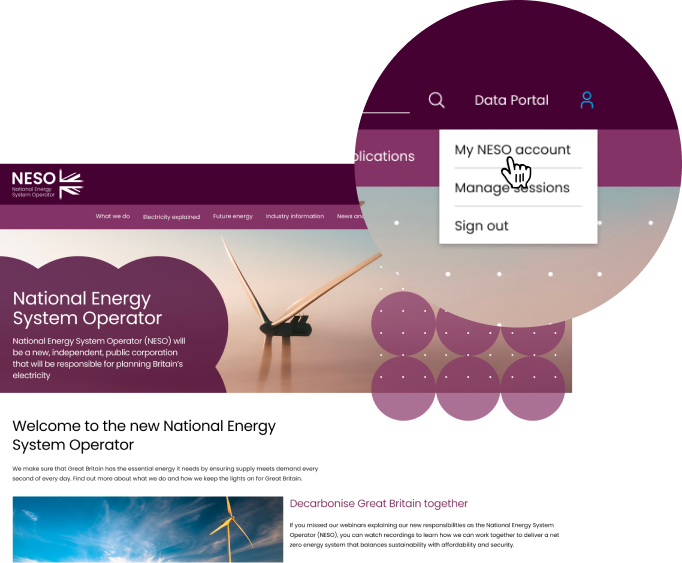Static Firm Frequency Response (SFFR)
The minimum entry threshold for SFFR is 1MW which can be provided by either a single or aggregated assets. The requirements for delivery of SFFR are as follows.
- Static frequency response is a non-dynamic frequency response service which is triggered at a defined frequency deviation (49.7).
- Static response – response provided within 30 seconds and sustained until 30 minutes following the point at which the frequency trigger was reached.

Static Firm Frequency Response 2025 Consultation Launch
On 20 Nov 2025 we launched our EBR Article 18 consultation to Industry, which is open until 5pm 19 Dec 2025. We are proposing several changes to the Static Firm Frequency Response (FFR) Service in this consultation that will encourage greater participation in our markets. The proposed changes address barriers to entry for flexibility providers and realise consumer value through improved performance management.

Consultation Documents
The consultation is an opportunity for industry to respond to the proposals and to offer their feedback and views. We encourage anyone interested in the proposals included in this Static FFR consultation to respond to the consultation before the deadline.
If you have any questions or would like to schedule a call, you can contact the team via email.
The indicative time frame for the consultation is outlined below.
| Completed | Published | November | December-March | April-May | July-August |
|---|---|---|---|---|---|
|
Image

|
|||||
SFFR is procured through a daily tender process. Once service providers succeed in the pre-qualification process through the Single Market Platform they will be able to tender into the daily tenders.
SFFR tender results are published on the ESO data portal.
As part of SFFR onboarding providers will need to test their assets in accordance with the testing procedure described in the SFFR Testing Guidance prior to being able submit tenders. For further information please contact your Account Manager or our commercial operations team: [email protected]
Current documentation
Guidance and supporting documents
| Name | Published Sort ascending |
|---|---|
| Static FFR Guidance | 20 Nov 2025 |
Asset testing
Before an asset can participate in the FFR tenders, it must pass testing for the service which it is bidding in to. Asset testing is a series of tests designed to prove that the assets can deliver the service according to the service design. Tests are signed off by an independent technical engineer, using the template in the testing documentation.
| Name | Published |
|---|---|
| FFR Dynamic Analysis Tool 2020 | 22 Jul 2019 |
| FFR Testing Guidance V14 Covering letter | 22 Jul 2019 |
| FFR Testing Guidance - FAQ Version 1.0 | 22 Jul 2019 |
| FFR Non-Dynamic Test Report sample test | 22 Jul 2019 |
| FFR Non Dynamic FFR Analysis Tool - User Guide 2019 | 22 Jul 2019 |
| FFR Non- Dynamic Analysis Tool 2019 | 22 Jul 2019 |
| FFR Dynamic Report - Sample test | 22 Jul 2019 |
| FFR Dynamic FFR Analysis Tool User Guide 2019 | 22 Jul 2019 |
| FFR Testing Guidance V14 | 22 Jul 2019 |
| Final Proposal - Performance Methodology Trial 22.11.17 | 22 Nov 2017 |
Contractual documents
FFR's contractual documents include the latest standard contract terms and a signed framework agreement.
| Name | Published |
|---|---|
| SFFR - Tender submission - Provider details | 24 Mar 2023 |
| SFFR auction participation guidance | 24 Mar 2023 |
| SFFR - Example file - CSV SFFR bid submission file with guidance comments | 24 Mar 2023 |
| SFFR - Template - SFFR bid submission | 24 Mar 2023 |
| Static FFR Procurement Rules | 24 Mar 2023 |
| Static FFR Service Terms | 24 Mar 2023 |
| FFR SCTs (v.10 2019) redline to remove Static service - applicable from 1 Apr 23 | 17 Feb 2023 |
| FFR Standard Contract Terms - Issue 10 | 9 Oct 2019 |
| FFR Fax Forms | 3 Oct 2015 |
Market information reports
We publish the FFR post-tender reports and market information reports from TR136 onwards on the NESO data portal.
| Name | Published Sort ascending |
|---|---|
| Frequency Response Products MIR Jan 2024 | 1 Jan 2024 |
| Frequency Response Products MIR Dec 2023 | 1 Dec 2023 |
| Frequency Response Products MIR Nov 2023 | 1 Nov 2023 |
| Frequency Response Products MIR Oct 2023 | 1 Oct 2023 |
| Frequency Response Products MIR Sept 2023.v2 | 1 Sep 2023 |
| Frequency Response Products MIR Sept 2023 | 1 Sep 2023 |
| Frequency Response Products MIR Aug 2023 | 1 Aug 2023 |
| FFR Market Information Report Apr 2023 | 1 Apr 2023 |
| Frequency Response Products MIR Apr 2023 | 1 Apr 2023 |
| Static FFR Mock Auction: Results and Feedback - webinar slides | 9 Mar 2023 |
FFR framework agreements
There are several different FFR framework agreements. Depending on how you register the unit delivering the service (BM or non-BM), and how the unit is made up (single or aggregated assets) will determine which framework agreement you'll need. It's possible to have multiple framework agreements.
| Name | Published |
|---|---|
| FFR Agreement- Dynamic and Non BM Dynamic (domestic aggregation) | 22 Jun 2020 |
| FFR Agreement - For BM Units | 5 Oct 2017 |
| FFR Agreement - Dynamic and Non BM (Aggregation) | 12 May 2017 |
| FFR Agreement - Dynamic and Non BM | 12 May 2017 |
